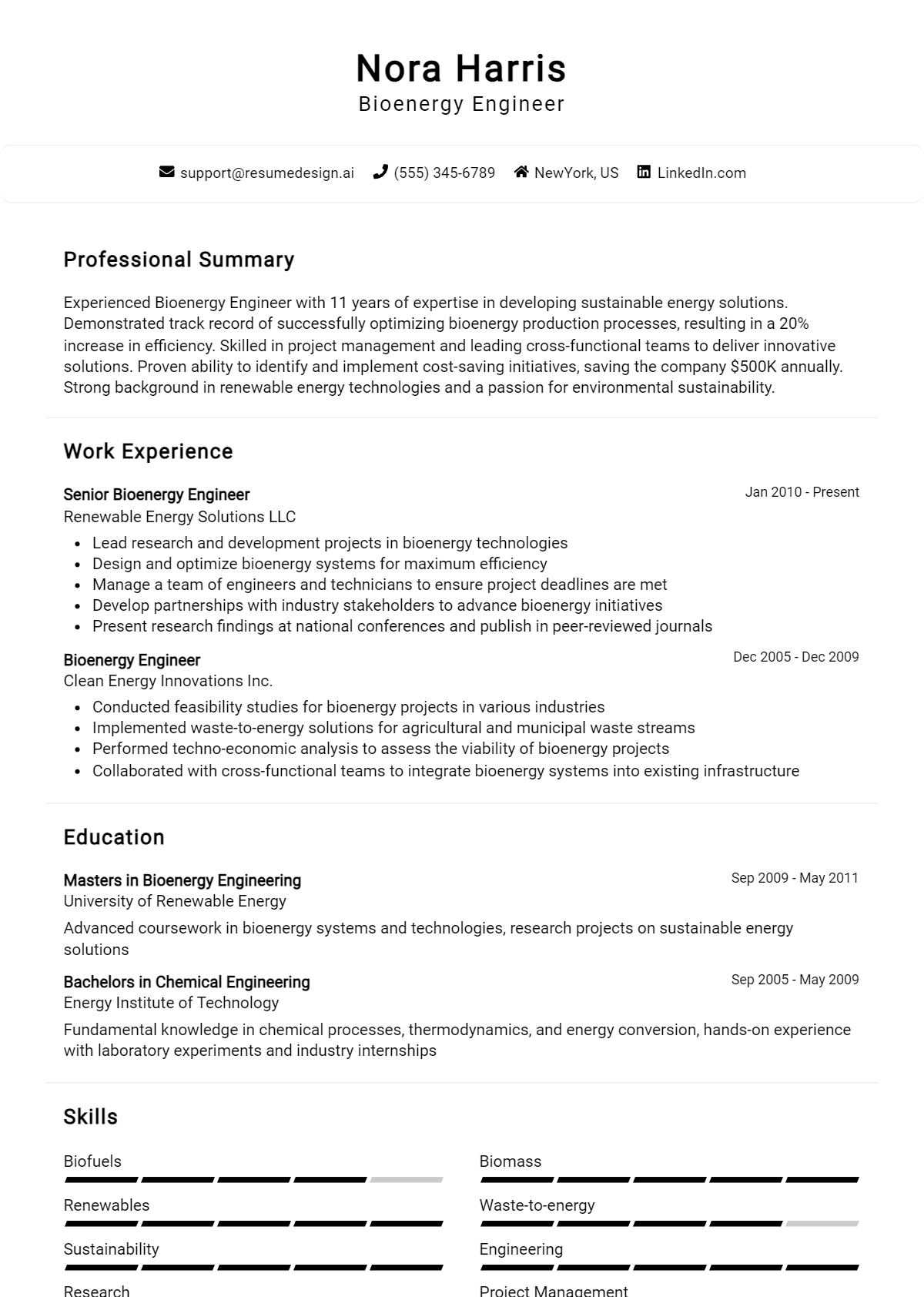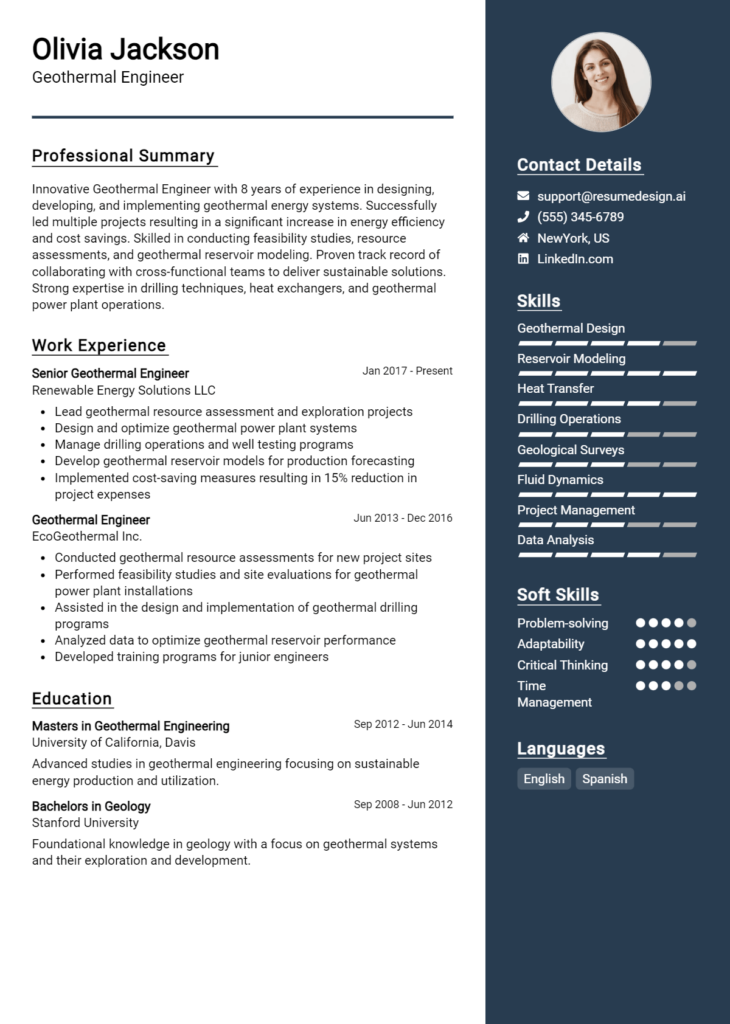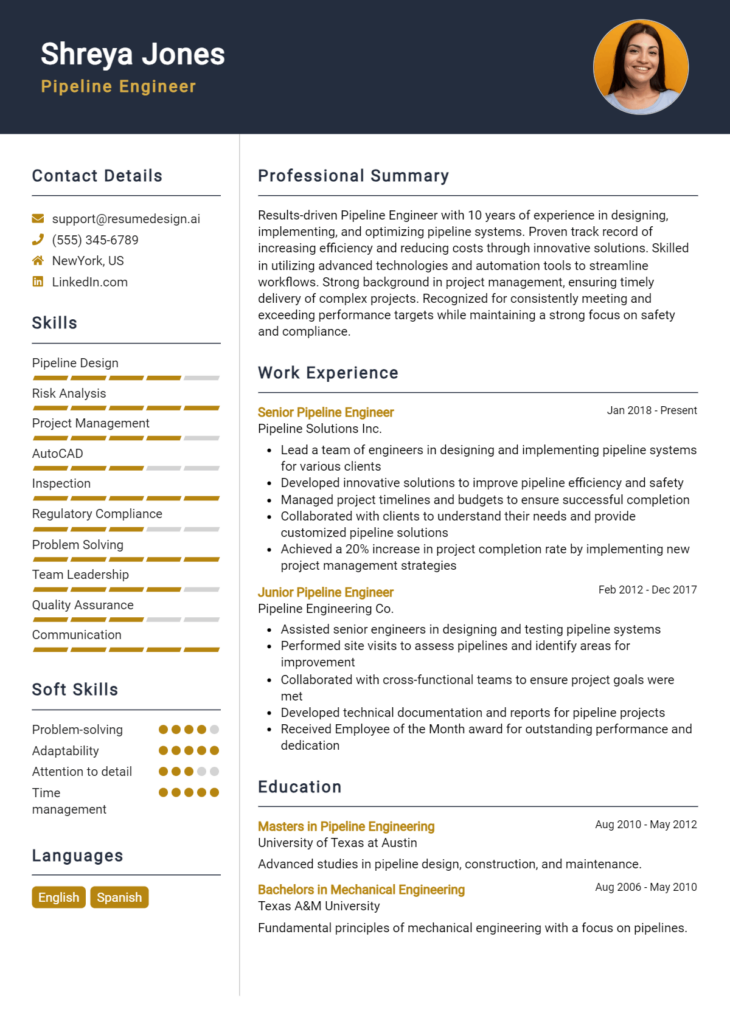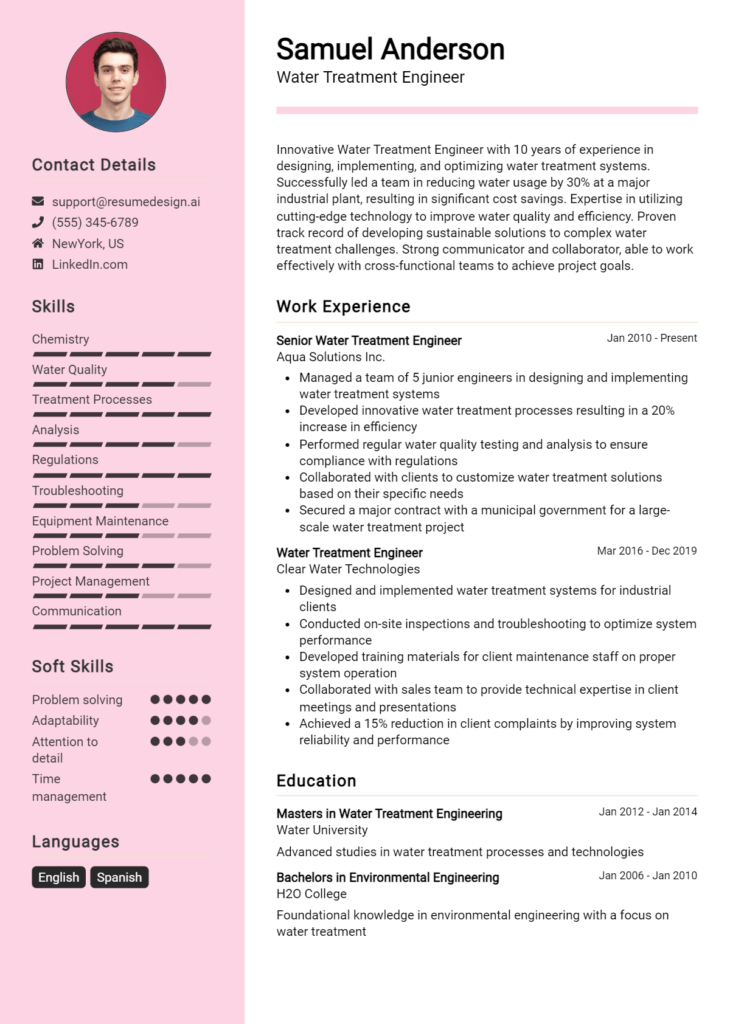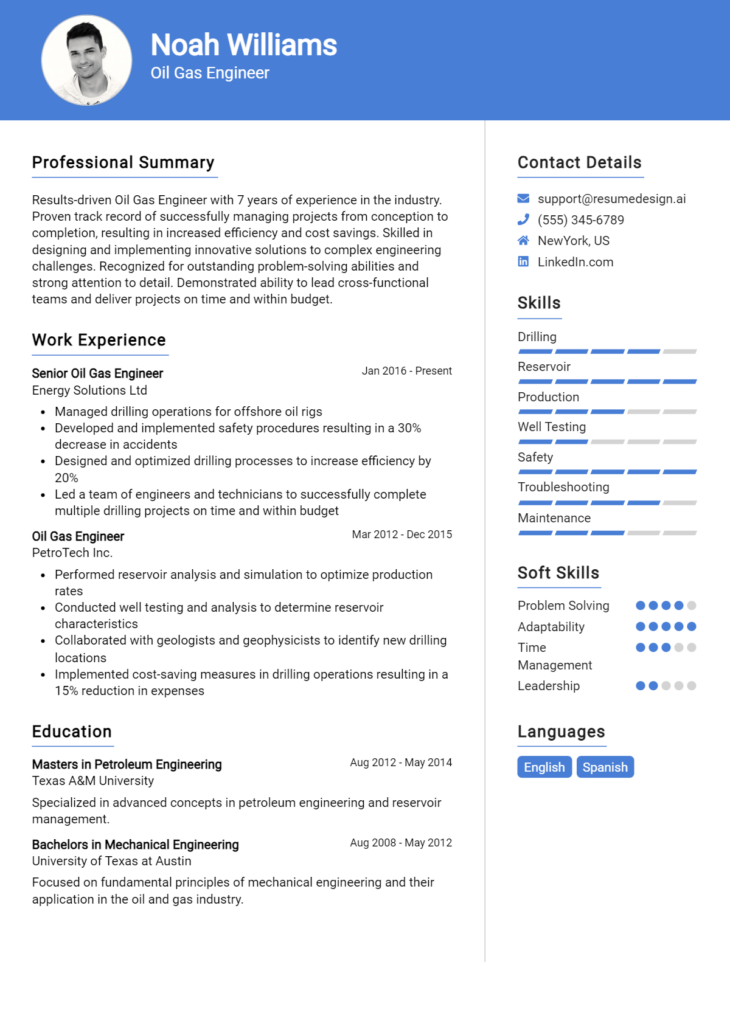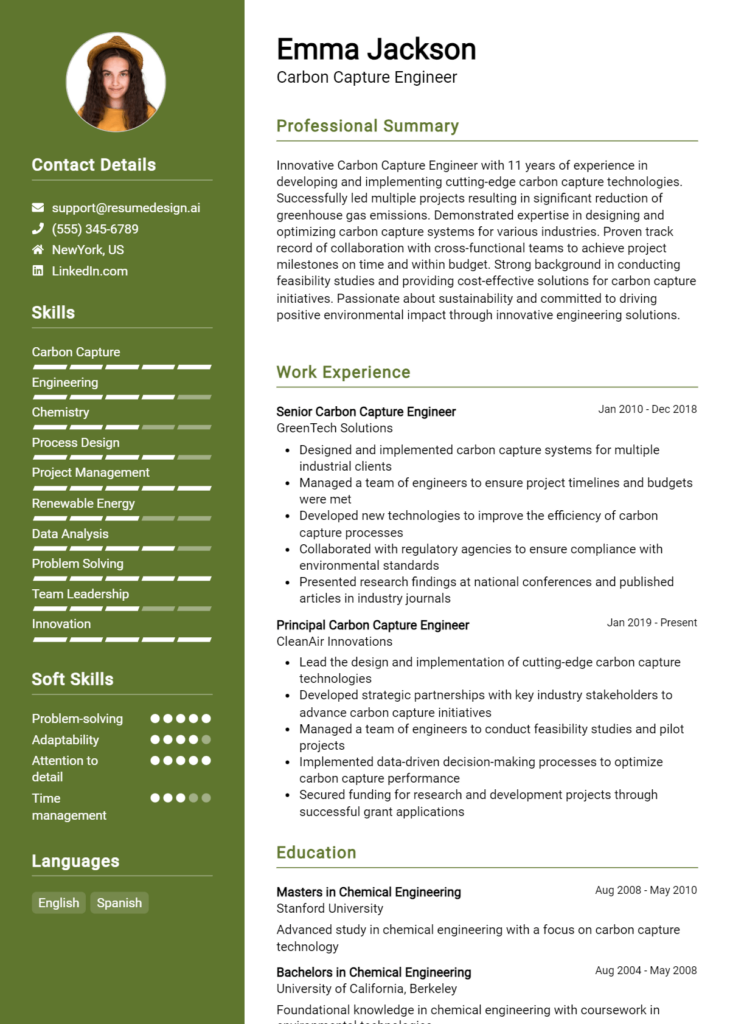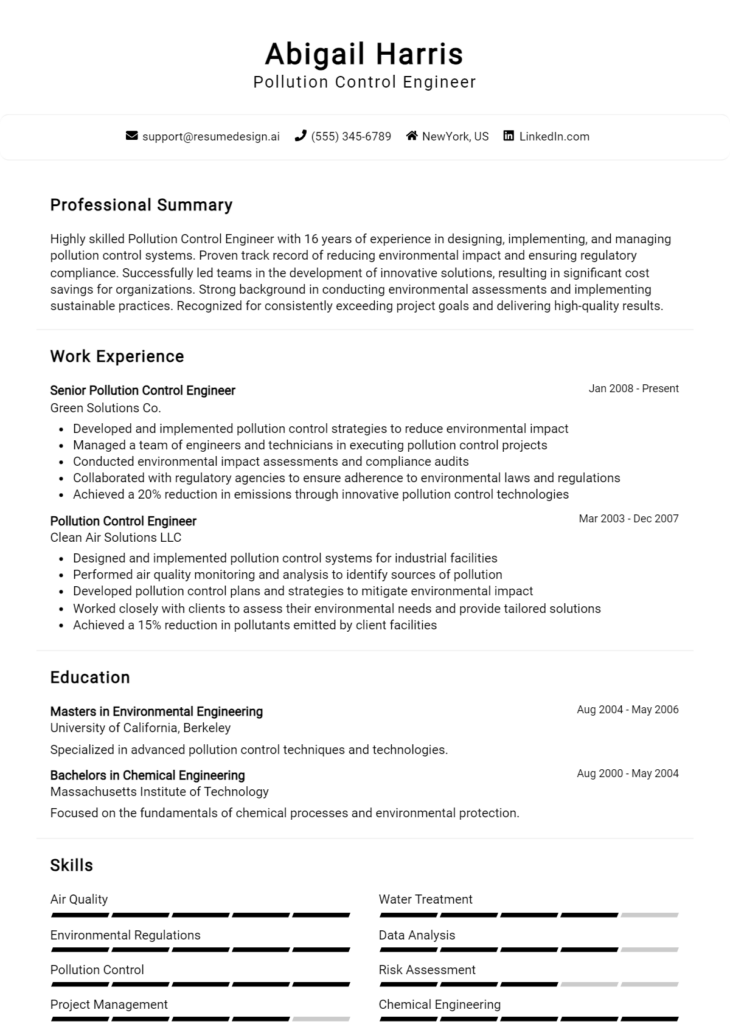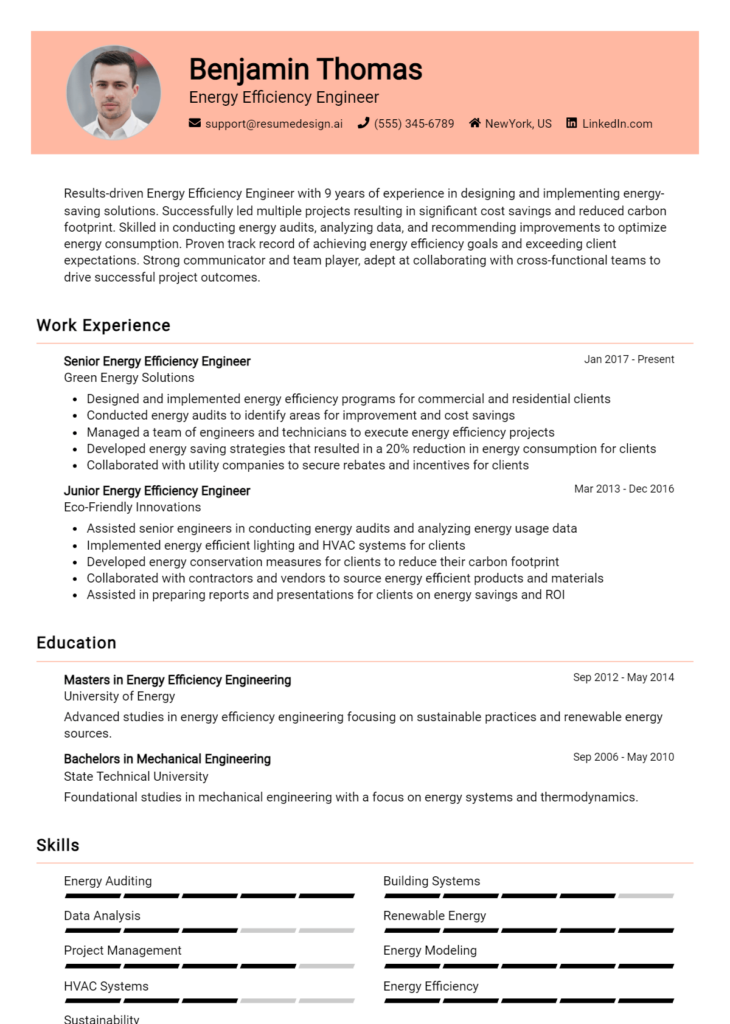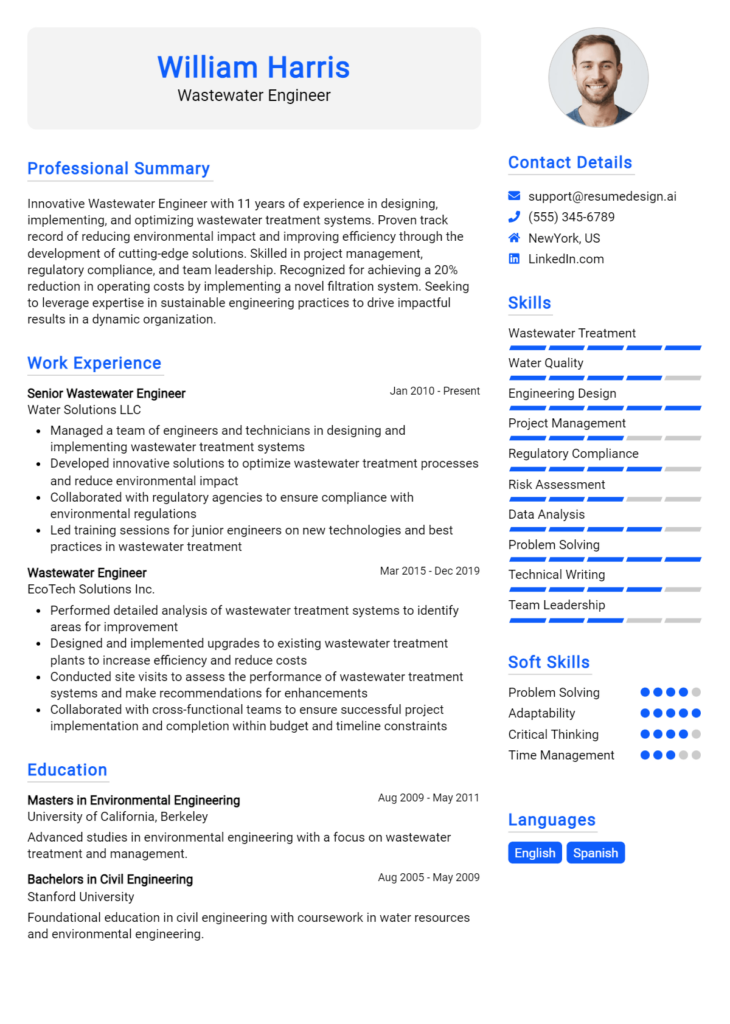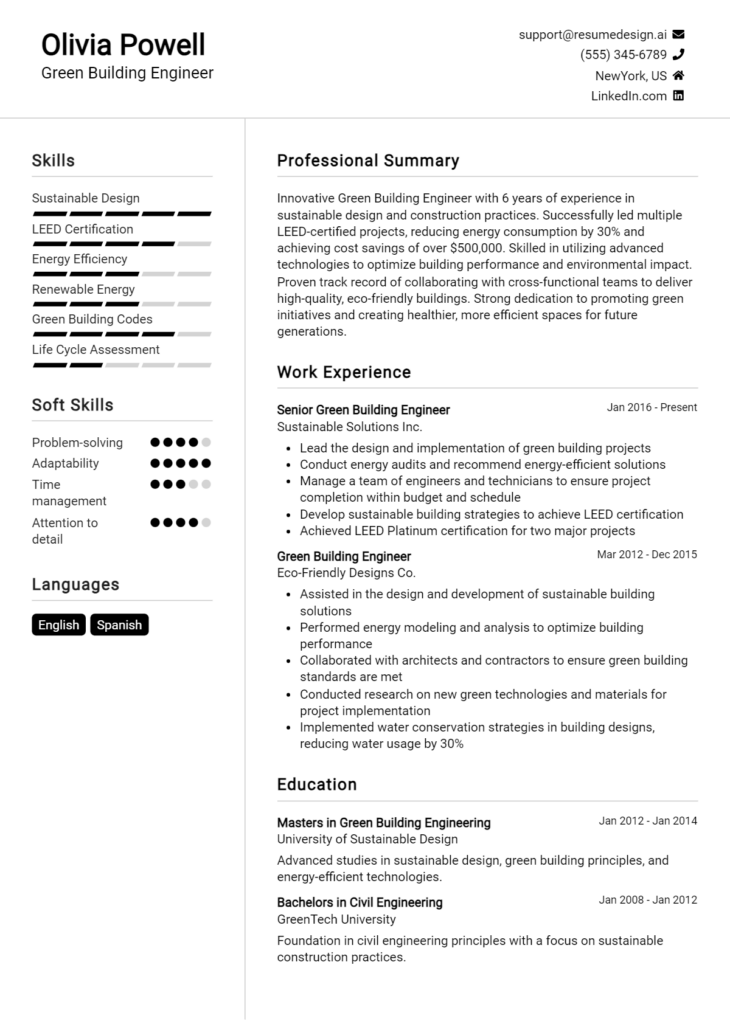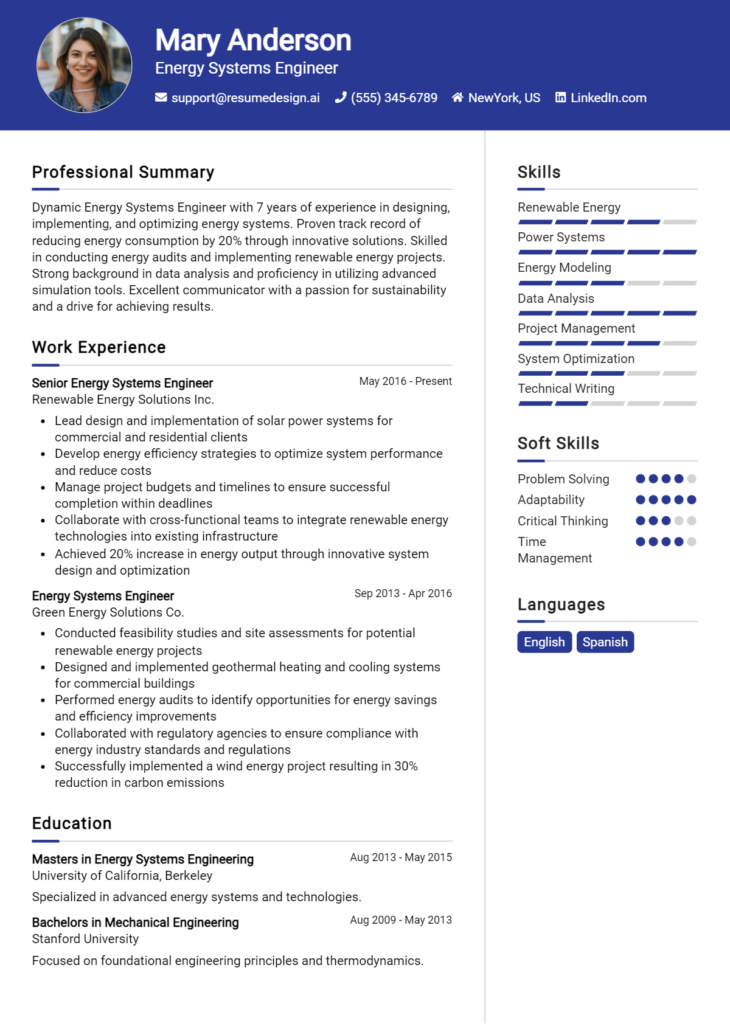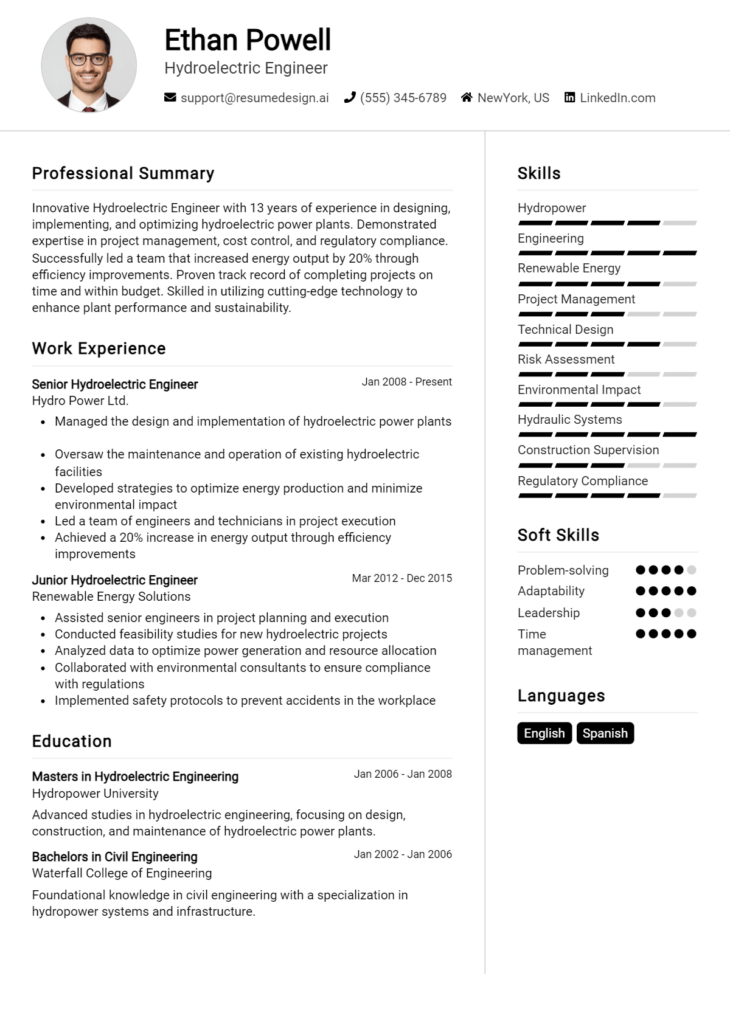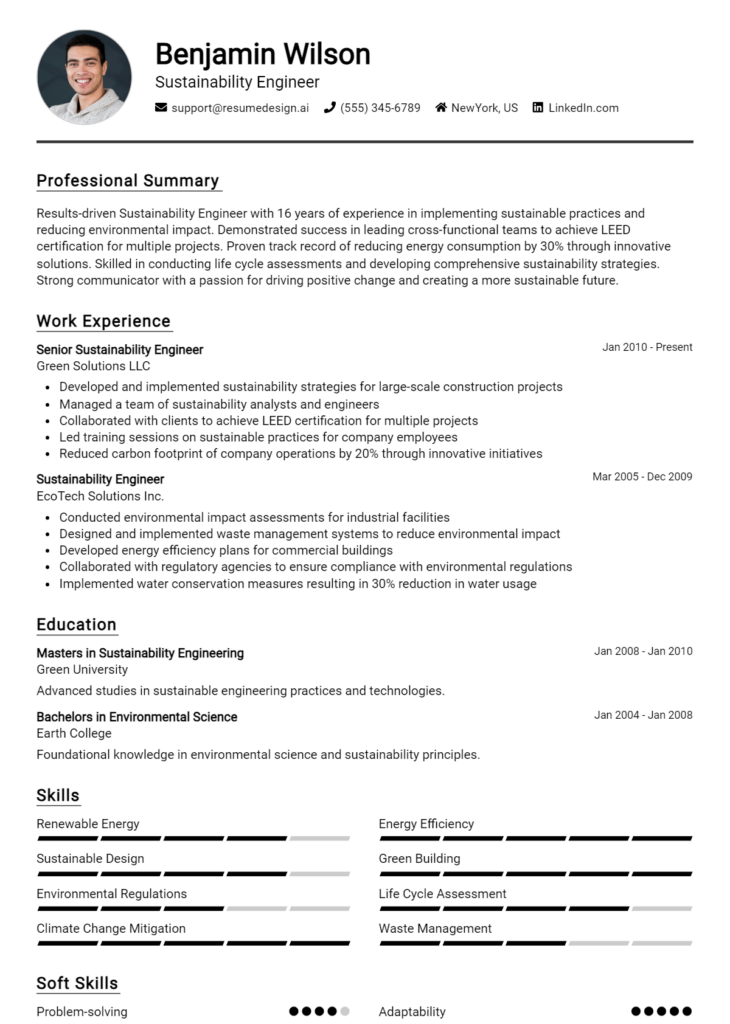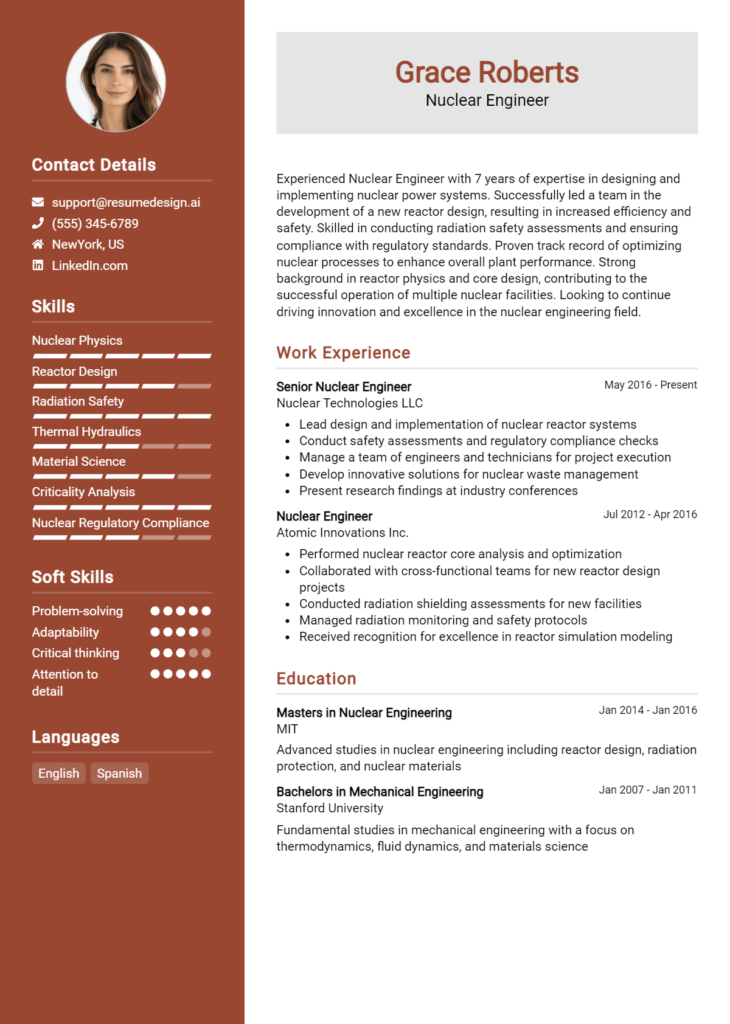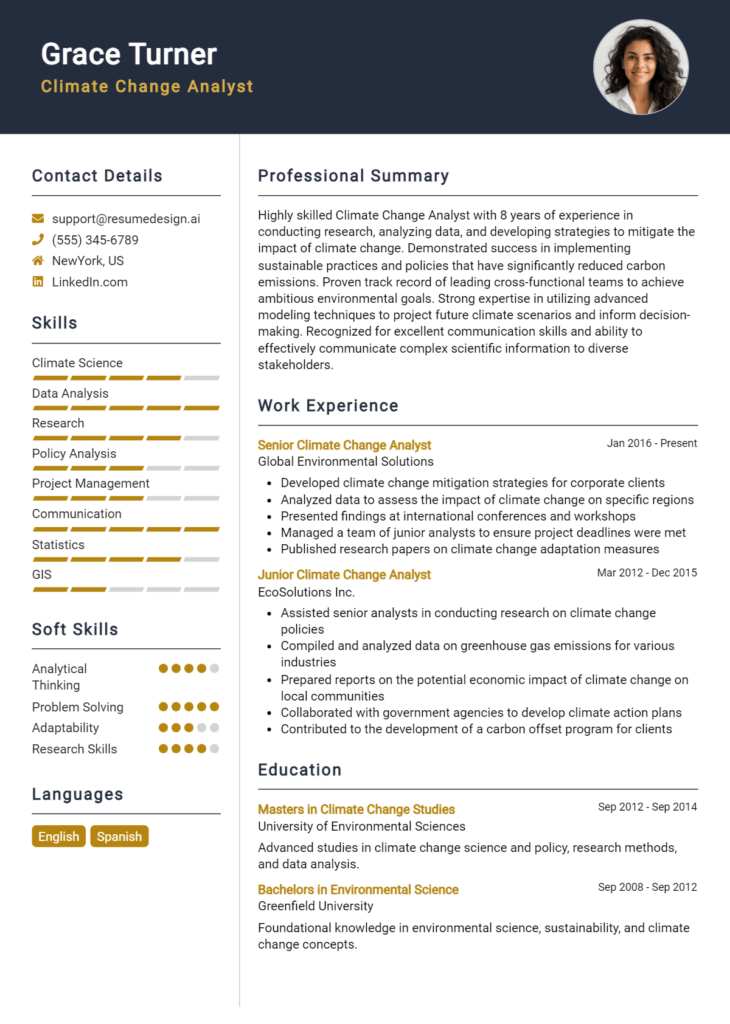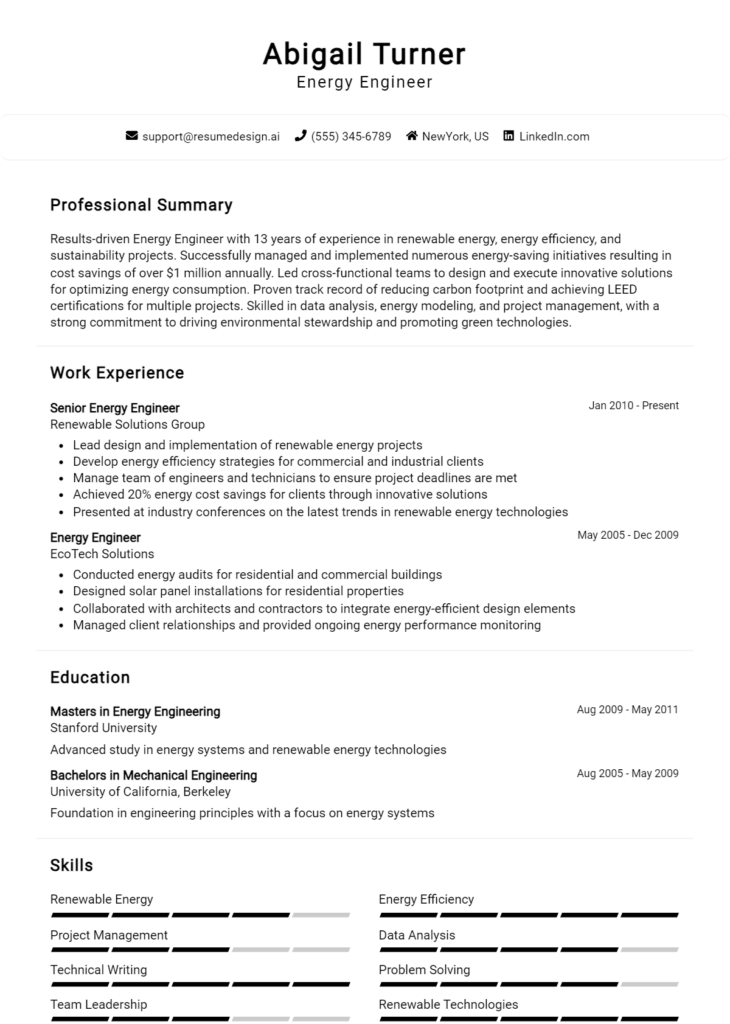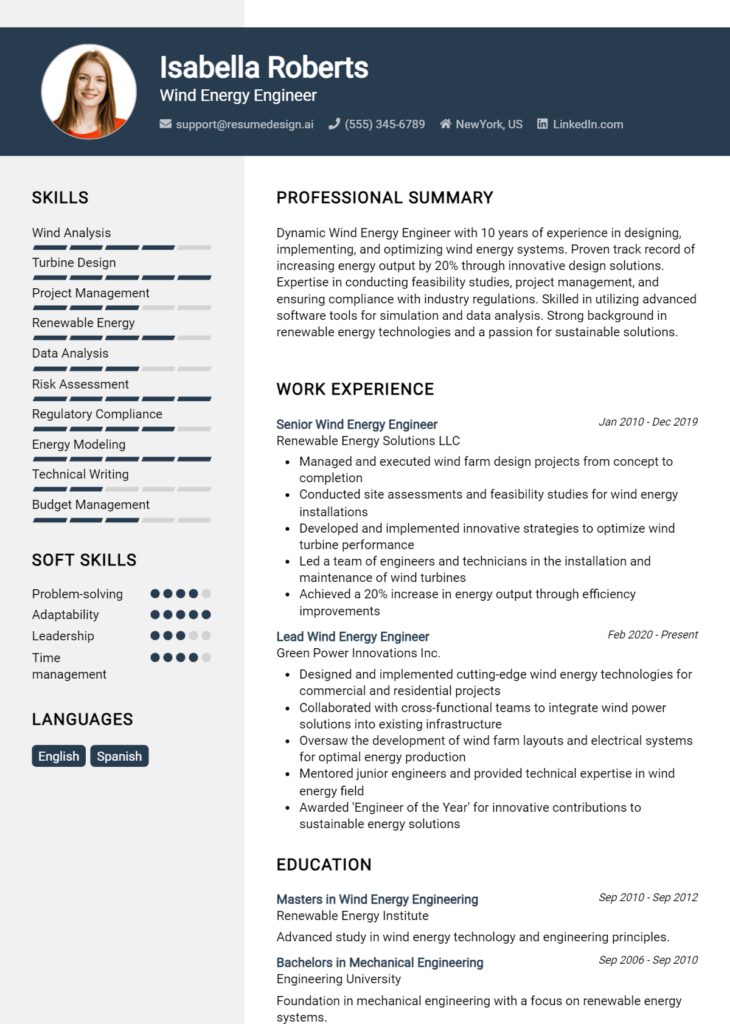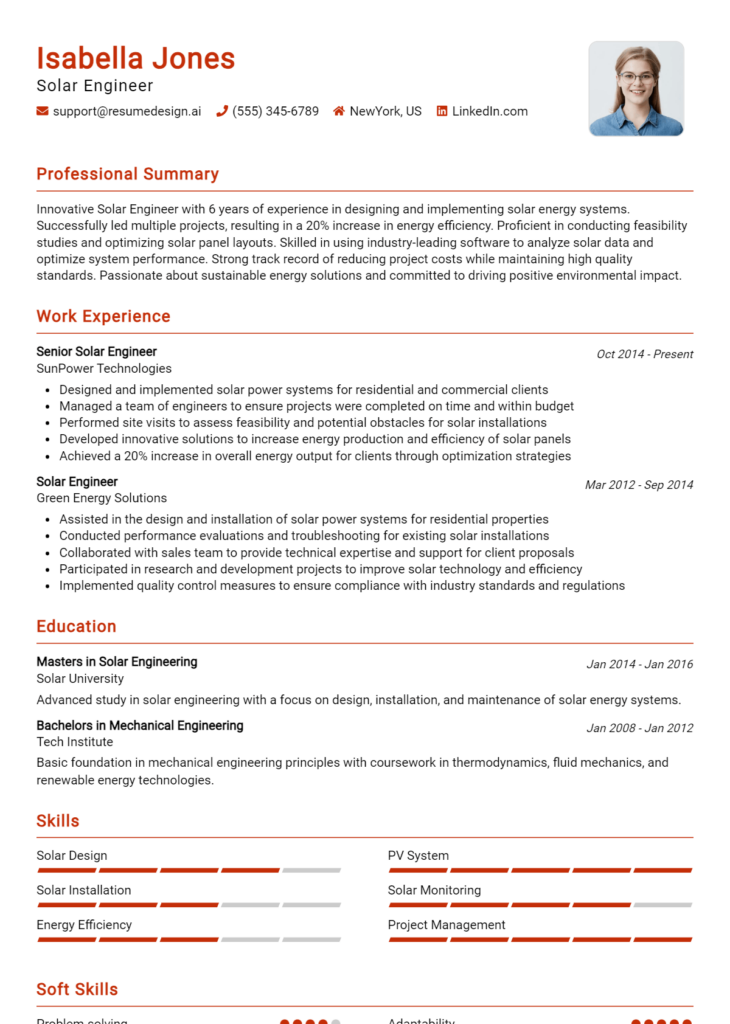Bioenergy Engineer Core Responsibilities
A Bioenergy Engineer plays a crucial role in developing sustainable energy solutions by designing and optimizing bioenergy systems. This position requires a strong blend of technical expertise in renewable energy technologies, operational knowledge of biomass conversion processes, and advanced problem-solving skills to address complex challenges. Collaboration across departments, such as research and development, environmental compliance, and project management, is essential to align bioenergy initiatives with organizational goals. Highlighting these competencies on a well-structured resume is vital for demonstrating value to potential employers.
Common Responsibilities Listed on Bioenergy Engineer Resume
- Design and implement bioenergy systems and processes.
- Conduct feasibility studies and environmental assessments.
- Optimize biomass conversion techniques for efficiency and sustainability.
- Collaborate with cross-functional teams to develop energy projects.
- Analyze data to evaluate system performance and identify improvements.
- Ensure compliance with regulations and industry standards.
- Research and develop innovative bioenergy technologies.
- Prepare technical reports and presentations for stakeholders.
- Manage project timelines and budgets effectively.
- Provide technical support and training to operational staff.
- Monitor and troubleshoot bioenergy systems in operation.
- Stay updated on advancements in renewable energy and biotechnologies.
High-Level Resume Tips for Bioenergy Engineer Professionals
In the competitive field of bioenergy engineering, a well-crafted resume serves as your first and often only chance to make a lasting impression on potential employers. It is crucial that your resume not only reflects your technical skills and achievements but also conveys your passion for renewable energy and sustainability. A targeted resume can set you apart from the competition by clearly demonstrating your value to prospective employers. In this guide, we will provide practical and actionable resume tips specifically tailored for bioenergy engineer professionals, ensuring that your application stands out in the ever-evolving landscape of green technology.
Top Resume Tips for Bioenergy Engineer Professionals
- Tailor your resume to each job description, highlighting the skills and experiences that align with the specific requirements of the position.
- Showcase relevant experience by including internships, research projects, or practical applications of bioenergy technologies.
- Quantify your achievements whenever possible, using metrics to demonstrate the impact of your work on projects or processes.
- Highlight industry-specific skills such as knowledge of biomass conversion, anaerobic digestion, and life cycle assessment.
- Include certifications or training related to renewable energy systems, energy management, or environmental sciences.
- Use action verbs to convey your contributions effectively, making your resume dynamic and engaging.
- Incorporate keywords from the job description to enhance your visibility in applicant tracking systems (ATS).
- Keep the layout clean and professional, ensuring that your contact information is easily accessible at the top of the resume.
- Consider adding a summary statement that encapsulates your expertise and career goals in the bioenergy sector.
By implementing these tailored resume tips, you can significantly enhance your chances of landing a job in the bioenergy engineer field. A focused and well-structured resume not only showcases your qualifications but also demonstrates your commitment to advancing sustainable energy solutions, making you a compelling candidate in a rapidly growing industry.
Why Resume Headlines & Titles are Important for Bioenergy Engineer
In the competitive field of bioenergy engineering, a well-crafted resume headline or title serves as a pivotal first impression for potential employers. This succinct phrase encapsulates a candidate's core qualifications and areas of expertise, enabling hiring managers to quickly assess their suitability for the role. A strong headline can capture attention immediately, acting as a powerful hook that encourages further exploration of the resume. It should be concise, relevant, and tailored to the specific job being applied for, ensuring that it resonates with the key requirements outlined in the job description.
Best Practices for Crafting Resume Headlines for Bioenergy Engineer
- Keep it concise: Aim for one impactful phrase, ideally under 10 words.
- Be role-specific: Tailor the headline to align with the bioenergy engineering position.
- Highlight key skills: Emphasize critical skills relevant to bioenergy engineering, such as renewable energy systems or environmental sustainability.
- Showcase experience: Include years of relevant experience or notable projects to strengthen your position.
- Use strong action words: Begin with powerful verbs that convey competence and capability.
- Incorporate industry keywords: Use terminology that resonates with the bioenergy sector to improve visibility.
- Avoid cliches: Steer clear of overused phrases that lack originality.
- Reflect your personal brand: Ensure the headline aligns with your professional identity and career goals.
Example Resume Headlines for Bioenergy Engineer
Strong Resume Headlines
Experienced Bioenergy Engineer Specializing in Renewable Energy Solutions
Innovative Bioenergy Specialist with 8 Years in Sustainable Fuel Development
Results-Driven Bioenergy Engineer with Proven Track Record in Project Management
Weak Resume Headlines
Engineer Looking for Job Opportunities
Dedicated Professional Seeking to Work in Bioenergy
The strong headlines are effective because they communicate specific skills, experiences, and accomplishments that directly relate to the bioenergy engineering role, making a compelling case for the candidate's fit. In contrast, the weak headlines fail to make an impact due to their vagueness and lack of distinctiveness, providing little information about the candidate's qualifications or value to potential employers. This distinction underscores the importance of a well-crafted headline in capturing attention and setting a positive tone for the resume.
Writing an Exceptional Bioenergy Engineer Resume Summary
A resume summary is a crucial component for a Bioenergy Engineer, serving as a powerful first impression for hiring managers. This concise paragraph distills your key skills, relevant experience, and noteworthy accomplishments into a snapshot that can quickly capture attention. An effective summary not only highlights your expertise in bioenergy solutions and renewable resources but also underscores your ability to contribute to sustainable initiatives. Tailoring this summary to align with the specific job description ensures it resonates with the employer's needs, making you a compelling candidate right from the start.
Best Practices for Writing a Bioenergy Engineer Resume Summary
- Quantify achievements: Use numbers and statistics to illustrate your impact and successes.
- Highlight relevant skills: Focus on technical and soft skills that are directly related to bioenergy engineering.
- Tailor for the job: Customize your summary to match the specific requirements mentioned in the job description.
- Keep it concise: Aim for 3-5 sentences that effectively communicate your value without overwhelming the reader.
- Use action verbs: Start sentences with strong action verbs to convey your contributions and initiatives.
- Showcase industry knowledge: Include specific knowledge or technologies relevant to the bioenergy sector.
- Demonstrate passion: Convey your enthusiasm for renewable energy and sustainability to connect with like-minded employers.
- Avoid jargon: Use clear and straightforward language to ensure your summary is easily understood.
Example Bioenergy Engineer Resume Summaries
Strong Resume Summaries
Results-driven Bioenergy Engineer with over 5 years of experience in developing sustainable energy solutions, successfully increasing biofuel production efficiency by 30% through innovative process improvements. Proven expertise in project management and team leadership, delivering projects on time and within budget in compliance with environmental regulations.
Dynamic Bioenergy Engineer specializing in waste-to-energy technologies, with a track record of designing systems that reduce greenhouse gas emissions by 40%. Adept at collaborating with cross-functional teams to implement renewable energy projects that enhance operational performance and sustainability.
Dedicated Bioenergy Engineer with a Master’s degree in Environmental Engineering, recognized for leading a team that optimized biomass conversion processes, resulting in a 25% reduction in costs and a 15% increase in output. Committed to advancing renewable energy initiatives through innovative research and development.
Weak Resume Summaries
Experienced engineer seeking a position in the bioenergy field. I have worked on various projects and have a strong background in engineering.
Bioenergy Engineer with some experience in energy projects. Looking to contribute to a team in a renewable energy company.
The strong resume summaries effectively highlight quantifiable achievements, specific skills, and direct relevance to the bioenergy engineering role, making them impactful and compelling. They provide clear evidence of the candidate's capabilities and contributions to the field. In contrast, the weak summaries lack detail and specificity, failing to convey the candidate's expertise or unique value, which diminishes their effectiveness in catching a hiring manager's attention.
Work Experience Section for Bioenergy Engineer Resume
The work experience section of a Bioenergy Engineer resume is vital as it serves as a testament to the candidate's technical skills and practical knowledge in the field of bioenergy. This section allows candidates to demonstrate their ability to manage teams effectively, deliver high-quality products, and navigate complex engineering challenges. By quantifying achievements and aligning their experience with industry standards, candidates can present a compelling narrative that showcases their contributions to previous employers and the bioenergy sector as a whole.
Best Practices for Bioenergy Engineer Work Experience
- Highlight specific technical skills related to bioenergy systems and processes.
- Quantify achievements with metrics such as energy output, cost savings, or project timelines.
- Showcase collaborative projects and your role in managing cross-functional teams.
- Align your experience with industry standards and best practices in bioenergy engineering.
- Use action verbs to convey your involvement and impact in previous roles.
- Include relevant certifications or ongoing education that enhance your expertise.
- Tailor your work experiences to reflect the requirements of the job you are applying for.
- Focus on accomplishments that demonstrate innovation and problem-solving capabilities.
Example Work Experiences for Bioenergy Engineer
Strong Experiences
- Led a team of 10 engineers to design and implement a biomass energy plant, achieving a 25% reduction in operational costs within the first year.
- Conducted feasibility studies for biofuel projects, resulting in securing $2 million in funding and a projected 15% increase in energy output.
- Collaborated with cross-disciplinary teams to develop a new biogas production process, improving yield efficiency by 30% and decreasing waste by 40%.
- Managed the installation of solar thermal systems for bioenergy applications, completing the project 3 months ahead of schedule and under budget.
Weak Experiences
- Worked on various projects related to bioenergy.
- Helped in the design of energy systems.
- Participated in team meetings and contributed ideas.
- Assisted in the completion of tasks as needed.
The examples of strong experiences are considered effective because they highlight specific accomplishments, quantify results, and demonstrate leadership and collaboration in significant projects. In contrast, the weak experiences lack detail and measurable outcomes, making them less impactful and harder to evaluate. They do not provide a clear picture of the candidate's capabilities or contributions to the bioenergy field.
Education and Certifications Section for Bioenergy Engineer Resume
The education and certifications section of a Bioenergy Engineer's resume plays a crucial role in establishing the candidate's qualifications and commitment to the field. This section not only highlights the academic background necessary for understanding the complexities of bioenergy systems but also showcases industry-relevant certifications that demonstrate specialized knowledge and skills. Continuous learning efforts, such as relevant coursework and specialized training, are essential for staying updated with the latest technologies and regulations in the bioenergy sector. By providing detailed information in this section, candidates can significantly enhance their credibility and align themselves with the specific requirements of the job role.
Best Practices for Bioenergy Engineer Education and Certifications
- Include only relevant degrees and certifications that pertain to bioenergy and related fields.
- List your highest degree first, followed by additional education in reverse chronological order.
- Highlight any specialized training programs or workshops that enhance your qualifications.
- Specify relevant coursework that aligns with the responsibilities of a bioenergy engineer.
- Incorporate industry-recognized certifications, such as those from professional organizations.
- Provide the year of completion for degrees and certifications to indicate current knowledge.
- Consider including honors or distinctions achieved during your studies.
- Tailor this section for each job application to emphasize the most pertinent qualifications.
Example Education and Certifications for Bioenergy Engineer
Strong Examples
- M.S. in Renewable Energy Engineering, University of Sustainable Energy, 2021
- Certified Bioenergy Professional (CBP), Bioenergy Association, 2022
- B.S. in Environmental Science with a focus on Bioenergy, Green University, 2019
- Advanced Workshop on Biomass Conversion Technologies, 2023
Weak Examples
- B.A. in History, State University, 2010
- Certification in Restaurant Management, Culinary Institute, 2015
- High School Diploma, Local High School, 2005
- Online Course in Basic Cooking Skills, 2022
The strong examples listed demonstrate a clear alignment with the qualifications necessary for a Bioenergy Engineer, showcasing relevant degrees, certifications, and specialized training that directly relate to the field. In contrast, the weak examples illustrate irrelevant educational backgrounds and certifications that do not contribute to the candidate's suitability for a role in bioenergy engineering, thereby failing to strengthen their profile in the eyes of potential employers.
Top Skills & Keywords for Bioenergy Engineer Resume
In the field of bioenergy engineering, possessing the right skills is crucial for both personal career advancement and the successful execution of projects aimed at promoting sustainable energy solutions. A well-crafted resume highlights these skills, demonstrating to potential employers that candidates not only understand the technical aspects of bioenergy but also possess the interpersonal abilities needed to work effectively in a multidisciplinary environment. As the demand for renewable energy sources grows, so does the need for bioenergy engineers who are not only technically proficient but also adept at communication, problem-solving, and collaboration. Emphasizing the right combination of hard and soft skills in a resume can significantly enhance a candidate’s appeal in this competitive field.
Top Hard & Soft Skills for Bioenergy Engineer
Soft Skills
- Communication Skills: Essential for collaborating with teams and conveying complex information to non-technical stakeholders.
- Teamwork: Ability to work effectively as part of a multidisciplinary team.
- Problem-Solving: Critical thinking to develop innovative solutions to engineering challenges.
- Adaptability: Flexibility to adjust to new technologies and methodologies in a rapidly evolving field.
- Attention to Detail: Precision in design and analysis to ensure safety and efficiency in bioenergy systems.
- Time Management: Ability to prioritize tasks and manage project timelines effectively.
- Leadership: Skills to guide teams and projects, fostering a collaborative work environment.
- Conflict Resolution: Aptitude for navigating and resolving disputes within teams or with stakeholders.
- Creative Thinking: Innovativeness in approaching bioenergy challenges and developing new methods.
- Interpersonal Skills: Ability to build relationships with colleagues and stakeholders, enhancing collaboration.
Hard Skills
- Biomass Conversion Technologies: Knowledge in techniques for converting biomass into energy.
- Renewable Energy Systems: Understanding of various renewable energy technologies and their applications.
- Process Engineering: Skills in designing and optimizing processes for bioenergy production.
- Data Analysis: Proficiency in analyzing data to improve efficiency and sustainability.
- Project Management: Experience in planning, executing, and overseeing engineering projects.
- Regulatory Knowledge: Familiarity with environmental regulations and compliance standards pertinent to bioenergy.
- Simulation Software: Expertise in using software for modeling and simulating bioenergy systems.
- Chemical Engineering Principles: Understanding of chemical processes relevant to bioenergy production.
- Environmental Impact Assessment: Skills in evaluating the ecological effects of bioenergy projects.
- Technical Writing: Ability to produce clear and concise documentation for reports and proposals.
For more insights on the importance of skills and how to effectively present your work experience, consider tailoring your resume to reflect these essential competencies.
Stand Out with a Winning Bioenergy Engineer Cover Letter
As a passionate Bioenergy Engineer with over five years of experience in renewable energy systems, I am excited to apply for the Bioenergy Engineer position at [Company Name]. My academic background in Environmental Engineering, coupled with hands-on experience in designing and implementing bioenergy solutions, positions me uniquely to contribute to your team. I have a strong commitment to advancing sustainable energy practices and am particularly drawn to [Company Name]'s innovative approach to bioenergy production and its focus on reducing carbon footprints.
In my previous role at [Previous Company Name], I successfully led a project aimed at converting agricultural waste into biofuels, which resulted in a 40% increase in energy efficiency and a significant reduction in waste disposal costs. I am skilled in conducting feasibility studies, optimizing bioenergy processes, and collaborating with multidisciplinary teams to ensure project success. My technical expertise in anaerobic digestion, biomass conversion, and energy system modeling has enabled me to develop solutions that not only meet regulatory standards but also exceed client expectations.
I am particularly impressed by [Company Name]'s commitment to research and development in the bioenergy sector, and I am eager to contribute my skills in process optimization and project management. I believe that my proactive approach to problem-solving and my ability to communicate complex ideas clearly will make me a valuable asset to your team. Furthermore, my dedication to continuous learning and professional development ensures that I stay abreast of emerging trends and technologies in the bioenergy field.
Thank you for considering my application. I am looking forward to the opportunity to discuss how my background, skills, and enthusiasms align with the goals of [Company Name]. I am eager to contribute to innovative bioenergy solutions that promote sustainability and drive positive change in the energy landscape.
Common Mistakes to Avoid in a Bioenergy Engineer Resume
When crafting a resume for a Bioenergy Engineer position, job seekers often make several common mistakes that can hinder their chances of landing an interview. Given the specialized nature of this field, it is vital to present qualifications and experiences effectively. Below are some pitfalls to avoid to ensure your resume stands out and accurately reflects your skills and expertise.
Lack of Tailoring: Failing to customize your resume for each job application can result in a generic presentation that doesn’t highlight relevant skills or experiences specific to the bioenergy sector.
Ignoring Keywords: Many employers use Applicant Tracking Systems (ATS) to filter resumes. Not incorporating industry-specific keywords can lead to your resume being overlooked.
Overly Technical Language: While technical expertise is crucial for a Bioenergy Engineer, using overly complex jargon without context can alienate hiring managers who may not be specialists in your exact area of expertise.
Neglecting Soft Skills: Focusing solely on technical skills and neglecting soft skills like teamwork, communication, and problem-solving can make your resume less appealing, as these attributes are often essential in collaborative engineering projects.
Inconsistent Formatting: A cluttered or inconsistent format can distract from your qualifications. Use a clean, professional layout with uniform font styles and sizes to enhance readability.
Omitting Relevant Certifications: Bioenergy engineering is a specialized field that often requires specific certifications. Failing to list relevant certifications can give the impression that you lack necessary qualifications.
Vague Job Descriptions: Providing vague descriptions of your roles and responsibilities can leave hiring managers confused about your actual contributions. Use quantifiable achievements and specific examples to demonstrate your impact.
Excessive Length: A lengthy resume can deter hiring managers from reading it fully. Aim for a concise, one-page resume unless you have extensive experience that justifies a longer format.
Conclusion
As we have explored throughout this article, the role of a Bioenergy Engineer is critical in advancing sustainable energy solutions. Key responsibilities include designing and implementing bioenergy systems, conducting research to enhance energy efficiency, and collaborating with cross-functional teams to address environmental challenges. The demand for skilled professionals in this field is growing, making it an exciting time to pursue a career in bioenergy.
To ensure your application stands out in this competitive landscape, it's essential to have a polished resume that highlights your skills and experiences effectively. Take a moment to review your Bioenergy Engineer resume and consider how it presents your qualifications. Are you showcasing your technical expertise, project management skills, and innovative solutions clearly?
To assist you in this process, we recommend utilizing available resources like resume templates, which can provide you with a professional layout. Additionally, our resume builder allows you to create a customized resume tailored to your career goals. Don't forget to check out resume examples to gain inspiration from successful candidates in your field. Lastly, a compelling cover letter can make a significant difference; explore our cover letter templates to craft a message that captures your passion for bioenergy.
Now is the time to take action! Update your resume and ensure it reflects your qualifications and enthusiasm for the role of a Bioenergy Engineer. Your next opportunity awaits!

